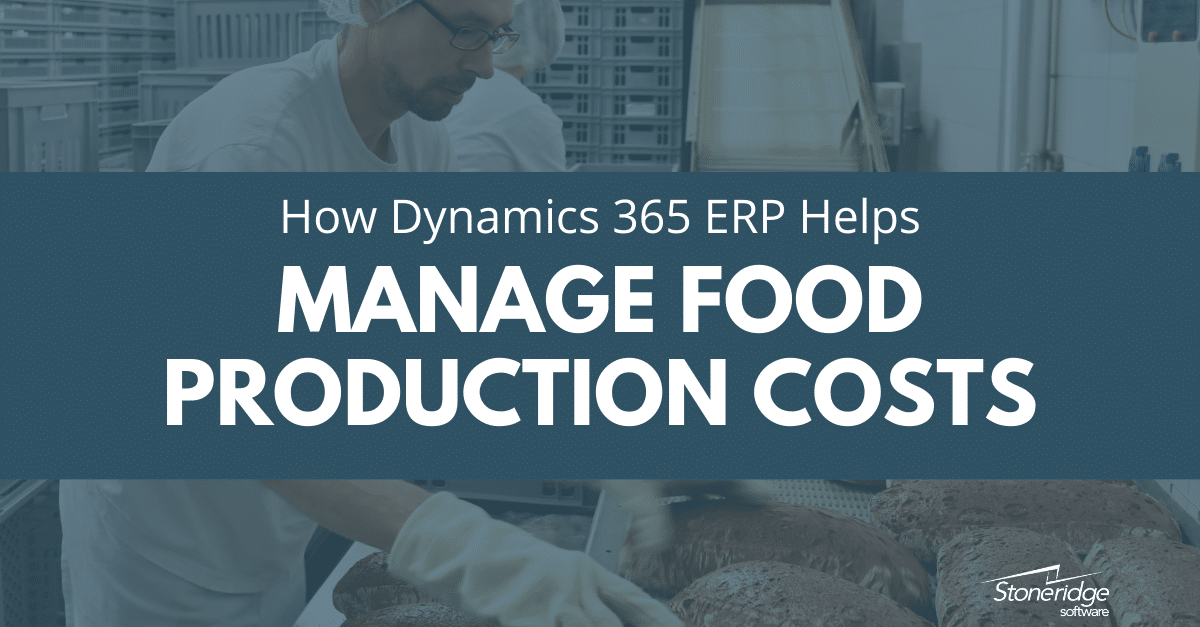The Important Role of Dynamics 365 ERP in Managing Food Production Costs
One of the major benefits of ERP systems is their ability to simplify and streamline operations, saving costs on what you already do.
Cloud-based, scalable, and built for the modern food industry, Microsoft Dynamics 365 ERP provides end-to-end visibility, automation, and control over operations—helping identify waste, reduce losses, and improve margins. Considering how much waste can be tracked, identified, and corrected using food and beverage industry software, upgrading to Microsoft D365 ERP may be your smartest investment this year.
Complete Visibility to Pinpoint Waste and Inefficiency
In food production, waste doesn’t just mean discarded ingredients—it includes inefficient workflows, unplanned downtime, overproduction, labor inefficiencies, and lost shelf life. Without full visibility across the supply chain, these hidden costs can quickly erode profitability.
Microsoft Dynamics 365 ERP provides a centralized platform to monitor:
- Raw material usage and losses
- Yield variances across batches or shifts
- Labor hours vs. production output
- Downtime events and their root causes
- Expired, damaged, or returned goods
By unifying financial, inventory, and production data, D365 helps operations managers identify the cost drivers and focus improvement efforts where they’ll have the most impact.
Integrated Microsoft 365 Tools for Collaboration and Control
A key advantage of Microsoft Dynamics 365 is its tight integration with Microsoft 365 (formerly Office 365), which most food businesses already use. By incorporating practical tools for collaboration, documentation, and decision-making, this ecosystem reduces unnecessary delays and improves data accuracy.
Key Microsoft 365 features embedded in D365:
- Excel for analyzing ingredient costs, budget forecasts, or production variances directly in Excel, with live D365 data connections
- Teams to easily collaborate across departments (e.g., operations, finance, QA) with Teams chat and video linked to D365 workflows
- Outlook integration to convert emails into D365 tasks or purchase orders without leaving your inbox
- Power BI for real-time analytics and tracking allows you to visualize sales trends and keep an eye on KPIs for data-driven decision-making
- OneDrive and SharePoint integration stores compliance and audit documents within production orders or quality tests.
Real-Time Cost Tracking and Variance Analysis
Food and beverage production costs are constantly shifting, affected by seasonal pricing, supplier contracts, and commodity volatility. ERP helps you stay agile by tracking standard vs. actual costs in real time.
With Dynamics 365 ERP, finance and production teams can monitor:
- Standard cost variances by SKU, production line, or batch
- Labor and overhead allocations vs. actual performance
- Material usage per recipe or formulation
- Packaging and labeling costs
These cost insights support better decision-making, such as when to adjust pricing, reformulate products, or renegotiate supplier terms. You can also use embedded Power BI dashboards to visualize profitability across product lines, customers, or markets.
Industry-Specific Integrations for Deeper Cost Control
With its powerful, cloud-based platform tailored for the food industry, D365 enables Microsoft Dynamics 365 to become even more powerful when paired with Independent Software Vendor (ISV) applications on Microsoft AppSource. These food manufacturing-specific apps are designed to work within D365, offering added capabilities like formulation management, allergen tracking, shelf-life control, and quality testing.
For example, YAVEON 365 integrates directly into D365 Business Central and enhances its functionality, making it more aligned with batch-based, regulated production. YAVEON enforces quality checks at every stage, simplifies compliance with food safety standards like FSMA, GFSI, IFS, and HACCP, and automates many documentation-heavy tasks like batch records, Certificates of Analysis (CoAs), safety data sheets, and compliance logs.
Demand-Driven Planning to Reduce Overstock and Shortages
Overproduction leads to waste, while underproduction leads to stockouts and rush orders—both costly scenarios. Dynamics 365 uses demand forecasting and planning tools to align production more closely with actual demand.
With demand planning features, manufacturers can:
- Use historical sales data to forecast seasonal and SKU-level demand
- Integrate customer orders and contracts into production schedules
- Plan inventory with min/max thresholds and lead-time buffers
- Avoid spoilage by factoring shelf-life data into replenishment cycles
This not only reduces unnecessary inventory carrying costs but also minimizes urgent procurement, which often comes at a premium.
Automating Workflows and Quality Checks
Manual quality checks, rework due to poor inspection, and inconsistent compliance practices drive up food production costs. D365 ERP supports workflow automation for key quality and safety tasks to reduce these inefficiencies.
Manufacturers can configure D365 to:
- Trigger quality holds if input materials fail tests
- Automatically schedule sanitation or maintenance between allergen-containing runs
- Log non-conformance incidents and calculate associated cost impacts
- Digitally capture QA results for audit and cost traceability
When quality is tightly managed, companies reduce rework, protect brand integrity, and avoid the high cost of recalls or regulatory penalties.
Let Stoneridge Revolutionize Your Food and Beverage Software Systems
Food and beverage manufacturing businesses—already juggling tight margins, supply chain volatility, and strict regulatory demands—often delay upgrading their ERP systems. But here’s the truth: outdated, disconnected systems may be costing you more than you realize. Inefficient processes, waste, labor overruns, and missed insights quietly erode profits over time.
Fortunately, thanks to cloud-based deployment, modular features, and built-in Microsoft tools you already use, moving to a more intelligent system is more affordable and less risky than ever before.
Ready to take control of your food production costs?
Contact the experts at Stoneridge Software today to discuss your brand-new ERP system.
Under the terms of this license, you are authorized to share and redistribute the content across various mediums, subject to adherence to the specified conditions: you must provide proper attribution to Stoneridge as the original creator in a manner that does not imply their endorsement of your use, the material is to be utilized solely for non-commercial purposes, and alterations, modifications, or derivative works based on the original material are strictly prohibited.
Responsibility rests with the licensee to ensure that their use of the material does not violate any other rights.






